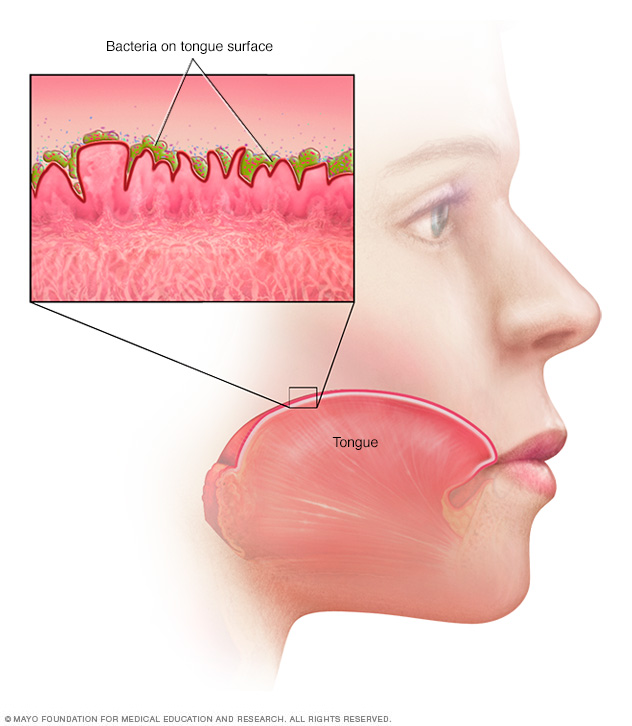Back Conditions Explained
Halitosis
Also known as bad breath

We have selected the following expert medical opinion based on its clarity, reliability and accuracy. Credits: Sourced from the Mayo Clinic, Minnesota. Please refer to your own medical practitioner for a final perspective, assessment or evaluation.
Overview
Bad breath, also called halitosis, can be embarrassing and in some cases may even cause anxiety. It's no wonder that store shelves are overflowing with gum, mints, mouthwashes and other products designed to fight bad breath. But many of these products are only temporary measures because they don't address the cause of the problem.
Certain foods, health conditions and habits are among the causes of bad breath. In many cases, you can improve bad breath with consistent proper dental hygiene. If simple self-care techniques don't solve the problem, see your dentist or physician to be sure a more serious condition isn't causing your bad breath.
Halitosis

Symptoms
Bad breath odours vary, depending on the source or the underlying cause. Some people worry too much about their breath even though they have little or no mouth odour, while others have bad breath and don't know it. Because it's difficult to assess how your own breath smells, ask a close friend or relative to confirm your bad-breath questions.
When to see a doctor
If you have bad breath, review your oral hygiene habits. Try making lifestyle changes, such as brushing your teeth and tongue after eating, using dental floss, and drinking plenty of water.
If your bad breath persists after making such changes, see your dentist. If your dentist suspects a more serious condition is causing your bad breath, he or she may refer you to a physician to find the cause of the odour.
Causes
Most bad breath starts in your mouth, and there are many possible causes.
They include:
- Food: The breakdown of food particles in and around your teeth can increase bacteria and cause a foul odour. Eating certain foods, such as onions, garlic and spices, also can cause bad breath. After you digest these foods, they enter your bloodstream, are carried to your lungs and affect your breath.
- Tobacco products: Smoking causes its own unpleasant mouth odour. Smokers and oral tobacco users are also more likely to have gum disease, another source of bad breath.
- Poor dental hygiene: If you don't brush and floss daily, food particles remain in your mouth, causing bad breath. A colourless, sticky film of bacteria (plaque) forms on your teeth. If not brushed away, plaque can irritate your gums and eventually form plaque-filled pockets between your teeth and gums (periodontitis). Your tongue also can trap bacteria that produce odours. Dentures that aren't cleaned regularly or don't fit properly can harbour odour-causing bacteria and food particles.
- Dry mouth: Saliva helps cleanse your mouth, removing particles that cause bad odours. A condition called dry mouth or xerostomia (zeer–o-STOE-me-uh) can contribute to bad breath because production of saliva is decreased. Dry mouth naturally occurs during sleep, leading to "morning breath," and it worsens if you sleep with your mouth open. Chronic dry mouth can be caused by a problem with your salivary glands and some diseases.
- Medications: Some medications can indirectly produce bad breath by contributing to dry mouth. Others can be broken down in the body to release chemicals that can be carried on your breath.
- Infections in your mouth: Bad breath can be caused by surgical wounds after oral surgery, such as tooth removal, or as a result of tooth decay, gum disease or mouth sores.
- Other mouth, nose and throat conditions: Bad breath can occasionally stem from small stones that form in the tonsils and are covered with bacteria that produce odour. Infections or chronic inflammation in the nose, sinuses or throat, which can contribute to postnasal drip, also can cause bad breath.
- Other causes: Diseases, such as some cancers, and conditions such as metabolic disorders, can cause a distinctive breath odour as a result of chemicals they produce. Chronic reflux of stomach acids (gastroesophageal reflux disease, or GERD) can be associated with bad breath. Bad breath in young children can be caused by a foreign body, such as a piece of food, lodged in a nostril.
Diagnosis
Your dentist will likely smell both the breath from your mouth and the breath from your nose and rate the odour on a scale. Because the back of the tongue is most often the source of the smell, your dentist may also scrape it and rate its odour.
There are sophisticated detectors that can identify the chemicals responsible for bad breath, though these aren't always available.
Treatment
To reduce bad breath, help avoid cavities and lower your risk of gum disease, consistently practice good oral hygiene. Further treatment for bad breath can vary, depending on the cause. If your bad breath is thought to be caused by an underlying health condition, your dentist will likely refer you to your primary care provider.
For causes related to oral health, your dentist will work with you to help you better control that condition.
Dental measures may include:
- Mouth rinses and toothpastes: If your bad breath is due to a build-up of bacteria (plaque) on your teeth, your dentist may recommend a mouth rinse that kills the bacteria. Your dentist may also recommend a toothpaste that contains an antibacterial agent to kill the bacteria that cause plaque build-up.
- Treatment of dental disease: If you have gum disease, you may be referred to a gum specialist (periodontist). Gum disease can cause gums to pull away from your teeth, leaving deep pockets that fill with odour-causing bacteria. Sometimes only professional cleaning removes these bacteria. Your dentist might also recommend replacing faulty tooth restorations, a breeding ground for bacteria.
Lifestyle and home remedies
To reduce or prevent bad breath:
- Brush your teeth after you eat: Keep a toothbrush at work to use after eating. Brush using a fluoride-containing toothpaste at least twice a day, especially after meals. Toothpaste with antibacterial properties has been shown to reduce bad breath odours.
- Floss at least once a day: Proper flossing removes food particles and plaque from between your teeth, helping to control bad breath.
- Brush your tongue: Your tongue harbours bacteria, so carefully brushing it may reduce odours. People who have a coated tongue from a significant overgrowth of bacteria (from smoking or dry mouth, for example) may benefit from using a tongue scraper. Or use a toothbrush that has a built-in tongue cleaner.
- Clean dentures or dental appliances: If you wear a bridge or a denture, clean it thoroughly at least once a day or as directed by your dentist. If you have a dental retainer or mouth guard, clean it each time before you put it in your mouth. Your dentist can recommend the best cleaning product.
- Avoid dry mouth: To keep your mouth moist, avoid tobacco and drink plenty of water — not coffee, soft drinks or alcohol, which can lead to a drier mouth. Chew gum or suck on candy (preferably sugarless) to stimulate saliva. For chronic dry mouth, your dentist or physician may prescribe an artificial saliva preparation or an oral medication that stimulates the flow of saliva.
- Adjust your diet: Avoid foods such as onions and garlic that can cause bad breath. Eating a lot of sugary foods is also linked with bad breath.
- Regularly get a new toothbrush: Change your toothbrush when it becomes frayed, about every three to four months, and choose a soft-bristled toothbrush.
- Schedule regular dental check-ups: See your dentist on a regular basis — generally twice a year — to have your teeth or dentures examined and cleaned.
_______________________________________________________________________________________________________________________
Are you a healthcare practitioner who enjoys patient education, interaction and communication?
If so, we invite you to criticise, contribute to or help improve our content. We find that many practicing doctors who regularly communicate with patients develop novel and often highly effective ways to convey complex medical information in a simplified, accurate and compassionate manner.
MedSquirrel is a shared knowledge, collective intelligence digital platform developed to share medical expertise between doctors and patients. We support collaboration, as opposed to competition, between all members of the healthcare profession and are striving towards the provision of peer reviewed, accurate and simplified medical information to patients. Please share your unique communication style, experience and insights with a wider audience of patients, as well as your colleagues, by contributing to our digital platform.
Your contribution will be credited to you and your name, practice and field of interest will be made visible to the world. (Contact us via the orange feed-back button on the right).
Disclaimer:
MedSquirrel is a shared knowledge, collective intelligence digital platform developed to share medical knowledge between doctors and patients. If you are a healthcare practitioner, we invite you to criticise, contribute or help improve our content. We support collaboration among all members of the healthcare profession since we strive for the provision of world-class, peer-reviewed, accurate and transparent medical information.
MedSquirrel should not be used for diagnosis, treatment or prescription. Always refer any questions about diagnosis, treatment or prescription to your Doctor.
